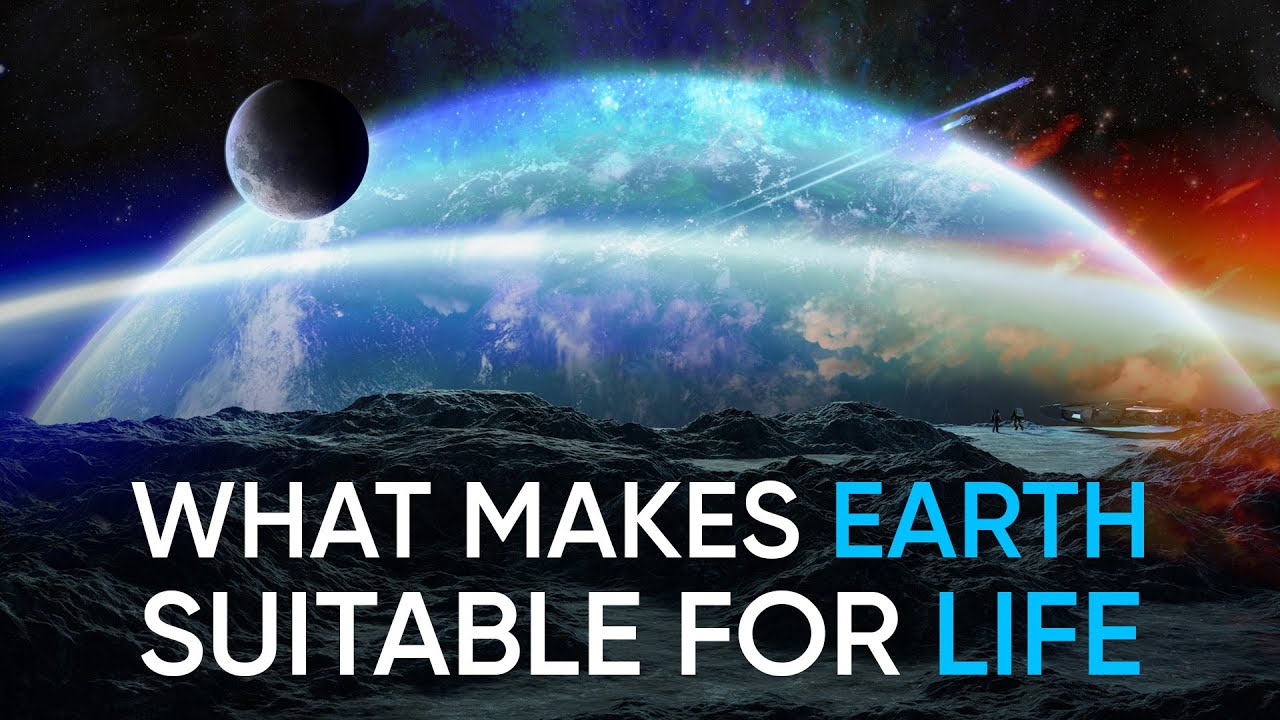What Is the Habitable Zone?
Summary
TLDRThis script explores Earth's habitability due to its ideal conditions for life, particularly the presence of water. It introduces the concept of the 'habitable zone' around stars, where exoplanets with atmospheres could potentially have liquid water. The video explains that while Earth is comfortably situated in our solar system's habitable zone, not all planets in such zones are habitable, as demonstrated by the Moon. The script also touches on the variability of habitable zones depending on star size and brightness, using Proxima Centauri and Kepler-90 as examples. It concludes with a hopeful outlook on discovering another Earth-like, water-covered exoplanet in a habitable zone.
Takeaways
- 🌏 We live on a planet called Earth, which is habitable due to the right conditions and ingredients for life.
- 💧 Water is an extremely important ingredient for life on Earth and is a key factor in determining habitability.
- 🌌 The search for habitable exoplanets focuses on the potential for liquid water on their surfaces.
- 📍 The habitable zone, or 'Goldilocks zone', is the optimal distance from a star where a planet could have liquid water.
- 🚀 Our solar system's habitable zone is between the orbits of Venus and Mars, with Earth perfectly placed.
- 🌕 Being in the habitable zone does not automatically make a celestial body habitable, as demonstrated by the Moon.
- ✨ The size and brightness of a star determine the location and size of its habitable zone.
- 🌟 Proxima Centauri, the nearest star to our Sun, has a habitable zone much closer and smaller due to its smaller size.
- 🌌 Not all stars with a habitable zone have planets within it; Kepler-90, similar to our Sun, has eight planets but none in the habitable zone.
- 🔭 The ongoing search for exoplanets increases the chances of finding another Earth-like, water-covered planet in a habitable zone.
- 🎵 The script ends on a hopeful and playful note, suggesting the excitement of potential future discoveries.
Q & A
What is the significance of water for life on Earth?
-Water is extremely important for life on Earth as it is a fundamental component for the evolution and flourishing of life as we know it.
What is an exoplanet?
-An exoplanet is a planet that orbits a star outside our solar system.
Why is the presence of liquid water on an exoplanet's surface considered important for its habitability?
-The presence of liquid water on an exoplanet's surface is considered important for its habitability because water is a key ingredient for life, as it is on Earth.
What is the habitable zone?
-The habitable zone, also known as the 'Goldilocks zone,' is the distance from a star where conditions might be right for liquid water to exist on the surface of a rocky planet with an atmosphere.
Where does the habitable zone extend in our solar system?
-In our solar system, the habitable zone extends from around the orbit of Venus to around the orbit of Mars.
Why isn't the Moon considered habitable, even though it is in the habitable zone?
-The Moon is not considered habitable because, despite being in the habitable zone, it lacks an atmosphere and the conditions necessary to support life as we know it.
How does the size and brightness of a star affect the location of its habitable zone?
-The size and brightness of a star determine the location of its habitable zone because a larger or brighter star will have a wider zone where temperatures are suitable for liquid water to exist.
What is the relationship between Proxima Centauri and its habitable zone?
-Proxima Centauri, being smaller and dimmer than our Sun, has a much smaller and closer habitable zone, indicating that its potentially habitable planets would need to orbit very close to the star.
How many planets does the star Kepler-90 have, and are any of them in the habitable zone?
-Kepler-90 has eight planets, but they are all located well inside the habitable zone, huddled close to the star.
What is the significance of finding a water-covered exoplanet in a habitable zone?
-Finding a water-covered exoplanet in a habitable zone would be significant as it would suggest the potential for life, making it a prime candidate for further study and exploration.
What does the term 'comfy habitable zone' imply in the context of the script?
-The term 'comfy habitable zone' implies an ideal location within a star's habitable zone where conditions are just right for the possibility of life, similar to Earth's position in our solar system.
Outlines

This section is available to paid users only. Please upgrade to access this part.
Upgrade NowMindmap

This section is available to paid users only. Please upgrade to access this part.
Upgrade NowKeywords

This section is available to paid users only. Please upgrade to access this part.
Upgrade NowHighlights

This section is available to paid users only. Please upgrade to access this part.
Upgrade NowTranscripts

This section is available to paid users only. Please upgrade to access this part.
Upgrade NowBrowse More Related Video

NASA Encontró lo Inimaginable en Marte y Confirma las sospechas

What Makes Earth Suitable For Life

Projetada para a vida Parte 1 | Origens #9

The Earth's Atmosphere

Origin and Structure of the Earth (Planet Earth) | Earth and Life Science

Exploring Venus: Active Volcanoes, Rugged Terrain, and Extreme Atmosphere Space Science Documentary
5.0 / 5 (0 votes)